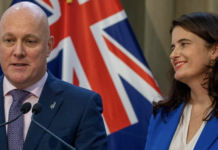Te Pāti Māori spokesperson for climate change and List MP based in Te Tai Hauāuru, Debbie Ngarewa-Packer stands with iwi and Māori landowners in opposition of proposed changes to the Emissions Trading Scheme (ETS).
“MPI has made proposals that would exclude Pine and exotic trees from the ETS, disenfranchising a thriving Māori economy on whenua that is and has always been ours,” said Ngarewa-Packer.
“Removal of Pine trees from the ETS means that Māori landowners, whether iwi, hapū or trusts will no longer generate revenue, further marginalizing and discriminating against both our whenua and wealth potential.
“Te Pāti Māori support planting natives and restoring our natural ecosystems. That lies at the heart of our vision for Aotearoa. However, natives are significantly more expensive and take longer to suck up the carbon. So what should have been be announced by Minister Shaw is a plan to incentivize this transition, making it easier for landowners to implement their own climate and economic solutions.
“Many Māori landowners across Aotearoa have written in opposition to the proposal. Landowners like Tairāwhiti Whenua are willing to work with Ministers and government to co-design, research, develop, and road-test but the Ministers don’t want a bar of it.
“Our land is faced by all sorts of inaccessibility issues – often located in the most rural of places, traversing typography that lines steep galleys and dense bush. In fact, 80% is not considered productive land – but is still suitable for planting of exotic forests.
“The Minister is giving predominately Pākehā farmers a free pass while punishing Māori landowners through these changes. That is not a just transition by any stretch of the imagination.
“My message to Minister Shaw is that adoption of these proposals will not only be discriminatory against Māori but represent a huge breach of Te Tiriti o Waitangi.
“It’s another case of bureaucracy that occurs at our expense. Instead of listening and consulting with Māori, ministries still think they know what’s best for us,” said Ngarewa-Packer.






Perhaps we should do a stock take on water and see who actually uses the most water in our country and whether they pay for it or get it for free. When we had water restriction in the greater Wellington region we were all asked to conserve water and the poorer areas did well but the more wealthier areas used a damn lot of water, in fact this lead to the Kapiti Coast installing water meters.